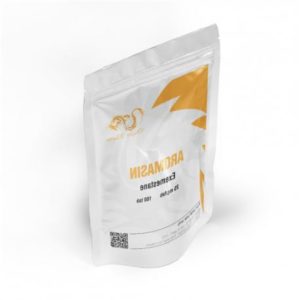Exemestane
Exemestane, also known as Aromasin, is a medication used in the treatment of breast cancer. It is classified as an aromatase inhibitor, meaning that it blocks the production of estrogen, a hormone that can fuel the growth of certain types of breast cancer. Exemestane is typically used in postmenopausal women who have been diagnosed with estrogen receptor-positive breast cancer, which means that the cancer cells are fueled by estrogen.
Exemestane is usually taken in tablet form, and is typically prescribed as a daily medication for a period of five years following surgery or other primary treatment for breast cancer. It is intended to reduce the risk of cancer recurrence by suppressing the production of estrogen in the body.
One of the primary benefits of exemestane is that it is generally well-tolerated by patients, with few serious side effects reported. The most common side effects of the medication include hot flashes, fatigue, and joint pain. However, these side effects are typically mild and temporary, and can often be managed with over-the-counter medications or lifestyle changes.
Exemestane is not appropriate for all breast cancer patients, and your doctor will consider a variety of factors before prescribing this medication. These factors may include the type and stage of your cancer, your overall health and medical history, and any other medications you are taking. In some cases, exemestane may be prescribed in combination with other medications, such as chemotherapy or radiation therapy, in order to achieve the best possible outcomes.
Like all medications, exemestane does carry some risks, and it is important to discuss these risks with your doctor before beginning treatment. Some of the potential side effects of the medication may include bone loss or fractures, increased risk of heart disease, and increased risk of developing certain types of cancer. Your doctor will carefully weigh the risks and benefits of exemestane for your particular situation, and will work with you to develop a personalized treatment plan that meets your needs.
If you are prescribed exemestane, it is important to take the medication exactly as directed by your doctor. This may include taking the medication at the same time each day, with or without food, and avoiding certain foods or medications that may interact with the drug. Your doctor may also recommend regular blood tests or other monitoring to ensure that the medication is working effectively and to monitor for any potential side effects.
In summary, exemestane is a medication used in the treatment of breast cancer, and is generally well-tolerated by patients. It works by blocking the production of estrogen in the body, and is typically prescribed in postmenopausal women with estrogen receptor-positive breast cancer. While there are some potential risks associated with the medication, these can be managed with careful monitoring and communication with your healthcare provider. If you have been diagnosed with breast cancer, talk to your doctor to learn more about the benefits and risks of exemestane and whether it may be an appropriate treatment option for you.
Showing the single result
